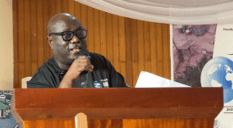By Juliet Aguiar DUGBARTEY
Prof. Anthony Ewusi, the Dean-Faculty of Geosciences and Environmental Studies at the University of Mines and Technology (UMaT), has emphasised the importance of conserving water bodies to promote sustainable water resource management.
He said despite efforts to improve access to water, millions in Ghana still lack safe water since most of the water bodies are polluted and cannot be relied on.
He noted that 76 percent of Ghanaians are at risk of drinking polluted water and faecal matter. “This shows we have poor sanitation and unsafe water for drinking. And this accounts for 80 percent of all diseases we have in the country.”
Prof. Ewusi was speaking at Stakeholders’ Durbar on World Water Day, organised by UMaT, Faculty of Geosciences and Environmental Studies in collaboration with Water Resources Commission and with support from Gold Fields Ghana Foundation at Tarkwa in the Western Region.
The celebration was on the theme ‘Glacier Preservation’, emphasising the importance of protecting glaciers which are vital source of freshwater for many people across the globe”.
According to him, UMaT has been celebrating the World Water Day over the past four year, focusing on the conservation of water and sustainable management.

He mentioned that the Bonsa River is the main source of water for the Tarkwa Municipality but because it is not sustainable, so many people have resorted to the use of borehole drilling and hand dug wells.
“This is a worry to us, and the underground water is also diminishing and you cannot depend on it because those involved in illegal mining activities are also pumping water at the ground for their work; and this affects the water level at Atuabo, UMaT Basic School, among other areas,” he pointed out.

Prof. Ewusi recalled that a study conducted by UMaT some years ago indicates that the abandoned underground mine for Gold Fields Ghana Limited (Tarkwa Mine) has some level of water in it which can take care of the water needs of Tarkwa township.
Therefore, he urged management of the company to consider treating the water, which would mean about 30 percent of water deficit is gone.
“Let us use water wisely and learn to consume water judiciously”, he advised.
The External Relations Manager of Ghana Manganese Company (GMC), Wisdom Adjei Mensah, who spoke on ‘Critical Role of Local Communities on Water Conservation’ said water sustains and nourishes the environment and drives industries.

“Yet despite its undeniable importance, water resources are under immense pressure due to population growth, industrial activities, deforestation, pollution, climate change, among others,” he said.
He said the local community has a role to play in water management in ensuring water sustainability and must develop effective ways of protecting water resources such as rain water harvesting to reduce dependency on ground water and minimise scarcity during dry season.
He added that the restoration of Ankobra River, which serves the people of the Western Region, should be considered by all.
Abdel Razak Yakubu, Executive Secretary of Gold Fields Ghana Foundation, praised UMaT for being a solution provider of most of the country’s water problems.
He wondered why a big mining company such as Gold Fields with huge machines and operating with lots of chemicals can treat water bodies at its premises very well but the ones outside the mines are polluted.
“We are regulated by the Environmental Protection Agency (EPA) to ensure that right thing is done for sustainable growth” he said.
He mentioned that the Gold Fields Ghana Foundation has dug 117 boreholes and more than 48 Small Town Water Supply Systems to the communities in the catchment area.
Also, he said the foundation has supported the municipal assembly to establish the Water and Sanitation Teams to take care of the boreholes and water systems in the operational areas.
“In fact, the teams are really doing well. At New Atuabo, apart from the three bore holes we dug for them, they have been able to dig four additional boreholes to serve the communities and schools for free; and must be commended and emulated” he added.
As part of this year World Water Day, the foundation is launching seven water projects. At Damang, they are a digging more than 100,000 litres of water to be spread through all the communities and that will be piped through 200 households.
“We are doing our best to ensure the communities have potable water. Let us do our best to protect the water that we have, we would come back and discuss this over and over again. We need to preserve our water, water is life”, Mr. Yakubu concluded.









